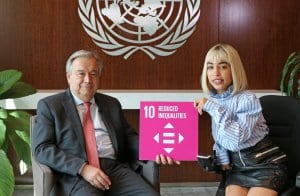More than 1 billion people in the world live with disabilities. Many of them cannot afford healthcare, attend school or find work. They often face overt discrimination, stereotyping and lack of respect for their basic human rights – with women and girls disproportionately affected.
Jillian Mercado always dreamed of working in the fashion world. But as a young girl using a wheelchair, she found that she didn’t relate to the models in the fashion magazines she was reading. Diagnosed with muscular dystrophy in her early teens, she realised that equal representation was severely lacking in a world where very few people with disabilities have risen.
Today, Jillian has become one of few models with a visible disability who is featured in major brand campaigns, and in 2018, she found herself featured on a giant billboard in New York’s Times Square. She has used her profile and rising influence to advocate for the rights of people with disabilities.
“[Having a disability] doesn’t stop me from doing anything. It’s an honour and a privilege to show people that it’s ok to be yourself and still do what you love,” says Jillian, who is committed to become the role model she wished she had as a child.
“All we want is to be provided with the same opportunities and be treated with the same respect like everybody else. I personally do my best to always have these conversations with anyone I meet. It is very important to spread this message so, by 2030, we can see the progress we have been a part of, and younger generations can benefit from.”
Jillian met with UN Secretary-General António Guterres in 2018 to discuss the Organization’s efforts to address inequality – particularly among women and girls with disabilities – and to discuss what more can be done to achieve Goal 10 of the SDGs.

“It’s crucial to know that people with disabilities are everywhere and only want to have equal opportunities – to live a fruitful life without any physical obstacles,” says Jillian. “It’s important for me as a public figure to do my best in reducing inequalities – not only for myself, but for anyone else who may not have the same platform as I do. When we are all given the same opportunity to succeed in life, we can develop a better future for generations to come. ”
With the power of social media, Jillian shares her own story, but focuses on highlighting the challenges that people with disabilities face daily – including disability representation in media. Visual representation of people with disabilities ensures inclusivity, and she wants to see more of it on TV and in magazines. She is also not afraid to to take on businesses – or even world leaders – to raise awareness on equal access and rights.
On the International Day of Persons With Disabilities (3 December 2018), the United Nations issued its first flagship report on disability and development titled “Realization of the Sustainable Development Goals by, for and with persons with disabilities”, recognizing the potential of people with disabilities as contributors to society and calling for policy changes to strengthen their rights and equal access.
“The United Nations serves as a megaphone, raising awareness globally on what needs to be changed so that we can live on a planet where everyone is treated equally and given the same opportunities. Having such a force behind us is the best opportunity to be seen and heard by the world and we must use this platform to create actual change for a better future for all.”


